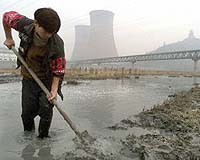| . |  |
. |
London (UPI) Dec 23, 2009 The international climate-change talks in Copenhagen have brought into sharper focus an aspect apparently sidelined amid all the bickering over carbon emissions. It is the impact of climate change on global security in the coming decades. Duncan Depledge, an analyst for the Royal United Services Institute, a London think tank, argues that "without binding commitments to reduce greenhouse gas emissions and stabilize expectations, climate change will have a huge impact on future security considerations." RUSI is an independent institution founded in 1831 by the Duke of Wellington and promotes itself as a forward-thinking forum committed to free discussion and careful reflection on defense and security matters. Academic scholars have done exhaustive research on linkages between the environment and security, but "the potential for climate change to influence security considerations has only recently emerged as a serious concern for the international community," says Depledge in an analysis published by RUSI. Amid political sniping, world leaders at the two-week summit in the Danish capital agreed to work toward comprehensive cuts in greenhouse gas emissions to slow the pace of global warming. The summit agreed that poor countries will also receive financial assistance to develop green energy technology, but the talks produced only a non-binding agreement that received mixed reactions. Depledge points out that climate change is increasingly referred to as a "threat multiplier." The danger to international security is seen as arising from the potential for climate change to exacerbate the political, economic and social conditions that underpin the security of both people and states. "The security dimensions of climate change are complex, but could potentially affect a plethora of issues concerning mitigation and adaptation strategies, energy security, nuclear proliferation, social justice and accountability, changing territorial boundaries, sovereignty claims, government legitimacy and the emergence of ungovernable spaces where non-state actors can operate with impunity," says Depledge. The links between climate change and security are now receiving much greater attention from governments in all parts of the world, he says, citing recent pronouncements in the United States, Europe, South America, Africa, the South Pacific, China, Indonesia and Japan. "Although there is recognition that climate change could create opportunities for greater collaboration between states, there is clearly growing concern about the potential for conflict, even violent conflict," says Depledge. "A changing climate threatens to push already tense situations relating to migration, food security, water security and energy security far beyond breaking point," he points out. Depledge's analysis follows a recent report prepared by U.N. Secretary-General Ban Ki-moon. Ban warned the impacts of climate change have the potential to "challenge the existing system of international security governance" with "serious consequences for the future security architecture of the planet." Depledge says failure to act decisively to deal with climate change "could undermine the current multilateral system. The outcome in Copenhagen will influence the extent to which climate change can be managed peacefully."
Share This Article With Planet Earth
Related Links Climate Science News - Modeling, Mitigation Adaptation
 Obama says climate discontent is 'justified'
Obama says climate discontent is 'justified'Washington (AFP) Dec 23, 2009 President Barack Obama said disenchantment over the Copenhagen climate talks was "justified" but defended the chaotic outcome as the top UN envoy urged an end to post-summit recriminations. The climate change conference held in the Danish capital ended last week with a non-binding agreement that the European Union has blasted as a Sino-US stitch-up which will do little to curtail global warm ... read more |
|
| The content herein, unless otherwise known to be public domain, are Copyright 1995-2009 - SpaceDaily. AFP and UPI Wire Stories are copyright Agence France-Presse and United Press International. ESA Portal Reports are copyright European Space Agency. All NASA sourced material is public domain. Additional copyrights may apply in whole or part to other bona fide parties. Advertising does not imply endorsement,agreement or approval of any opinions, statements or information provided by SpaceDaily on any Web page published or hosted by SpaceDaily. Privacy Statement |